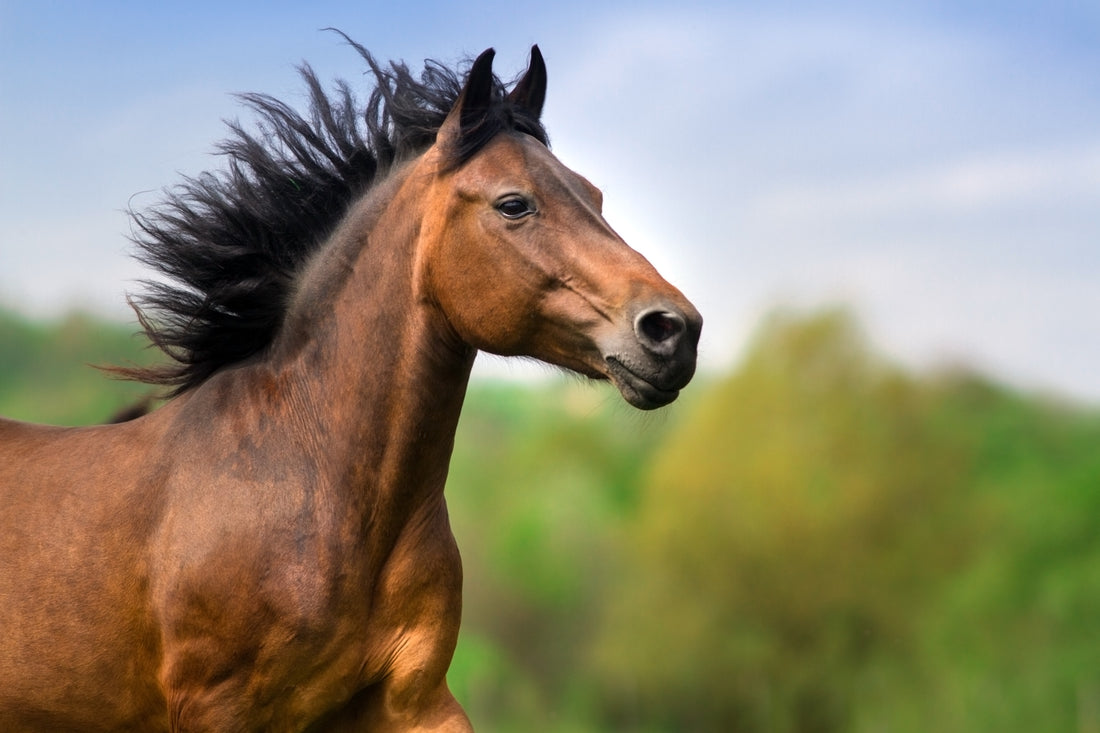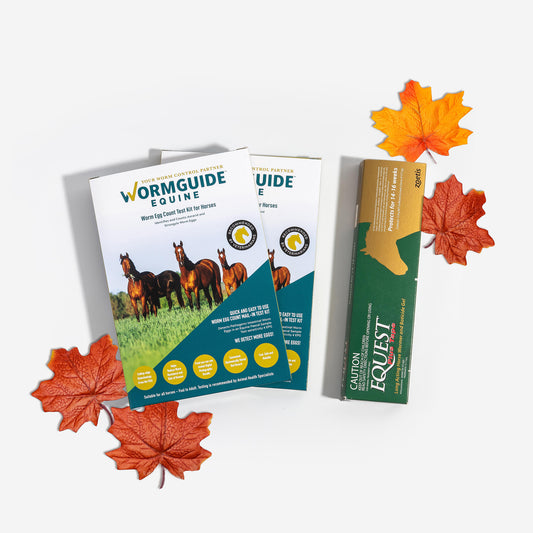Why We Love Poo and You Should Too. A Guide to Making Manure Your Horse Worm Control Ally
We’ve all heard of FOMO right? The Fear of Missing Out. But have you heard of FOPO? The Fear of Other People’s Opinions? We have.
The truth is, at WormGuide we’ve had a little FOPO, but have made up our minds not to let it hold us back.
We read somewhere that the best way to overcome FOPO is to come up with a personal philosophy - a clear sense of guiding principles to help us embrace our discomfort and stop worrying what other people might think. So, we did.
The WormGuide philosophy is - Do what matters.
We do what matters. It matters for our horses and our planet. It matters for our properties and our industry. And it matters because the choices we make now influence our future and future generations of horses.
You see – we test poo. We work with horse poo. We handle horse poo, we compost horse poo, we go to our post box to collect samples of horse poo. Day after day after day … poop, manure, faeces … lots of it, and we’ve been worried what you might think when we say, “We love horse poo!”
It is our hope that after reading this blog you will love horse poo too – at least a little more than you did before. Your horses poo is a gold mine of useful data and when you embrace the poo (forget the FOPO) you will see that poop is actually your horse worm control friend.
Top 3 reasons to love your horses’ poo
-
From a health perspective, your horses poo contains valuable information. Analysing the worm eggs in your horses’ manure and using the results to guide worming decisions allows you to individualise worm control efforts for better horse health outcomes.
-
The risk of worm infection can be reduced if poop is managed properly to prevent pasture contamination with eggs and larvae.
-
Correctly managed horse poop can help to control the accumulation of too many worms in your horse`s intestinal tract and can enrich your soil for happy healthy horse pasture (and happy healthy roses).
Let’s get it dung!
Evidence-based worm control is the best way to protect your horse from life-threatening intestinal worms. If you are still relying on horse wormers alone, you are making a big mistake!
Worm treatment regimens involving routine deworming of all horses throughout the year have been replaced by sustainable, scientific approaches to worm control. Killing the worms and the worm larvae that have infected your horse remains an essential worm control tactic, but the focus has shifted from a reliance on chemical horse wormers alone to faecal sample testing.
Modern worm control requires a multipronged approach:
- Horse worm control treatment strategies based on scientific worm egg count analysis of your horses’ faecal samples
- Annual worm egg count reduction testing to find out if resistance is present on your horse property
- And ongoing non-chemical strategies to decrease pasture contamination and reduce dangerous levels of worm infectivity.
No matter which way you look at it, the answer to giving your horse, and your herd, the best protection from disease-causing worms has been under your nose the whole time.
Horse poo - your ultimate worm control ally
Misguided worm control harms your horse, damages their environment, and makes it easier for disease-causing worms to build up resistance to the only medications we have to kill them. The more you know about your horses’ poop the better equipped you are to tailor worm control efforts to suit your horse and target their worm control needs. It’s time to make horse poo your worm control ally.
Our scientific analysis of your horses’ poo tells you if you need to worm now, or if worming can wait. It tells you which worms to target. It tells you if your wormer really did kill the worms and it even detects the development of horse wormer resistance on your property and if the worms have started the march toward resistance.
Protecting your horse or your horses against life-threatening intestinal worms is what really matters and correctly timed analysis of manure samples, combined with non-chemical methods of controlling horse worms, helps you to build worm control programs that work.
To help keep the remaining horse wormer medication classes effective and make protecting your horse from worm related illness even easier, get to know your horses’ poop.
Correct poo management = a better future for our horses
Reducing your reliance on chemical worming medications safeguards your horse’s future because with every worming treatment the worms on a horse property are one step closer to becoming chemical horse wormer resistant. There are only three major horse wormer classes used for intestinal worm control in Australian horses:
-
benzimidazoles (e.g. fenbendazole, oxfendazole and oxibendazole)
-
macrocyclic lactones [ML’s] (e.g. abamectin, ivermectin and moxidectin)
-
pyrimidines (e.g. morantel and pyrantel)
And worms on horse properties in Australia have tested resistant to one, two, or all three.
Sustainable worm control solutions are not only a good idea – they are necessary!
The sad truth is we may be able to make our remaining effective chemical products function a few years longer, but definitely not decades (Dr M. Nielsen).
We can’t afford to do nothing.
Let’s look at some of the non-chemical horse worm control measures that you should be using alongside evidence-based sustainable deworming.
-
Remove manure from horse pastures 2–3 times a week. We can decrease worm transmission (horses ingesting ascarid eggs and infective strongyle larvae) just by removing manure from pasture on a regular basis. So, slap on the sunscreen and use clean up time to get a dose of vitamin D; plug in your headphones and listen to a podcast; or pay the kids to pick up the poop for you. No matter what line you take be sure to remove worm egg infested poop from your pasture. Keep in mind climatic conditions will affect this strategy. The ability of strongyle eggs passed in the manure to hatch and develop into infective larvae is strongly influenced by the local weather. Read more about this in our What Do My Results Mean? Guide.
-
Get to the poo before the rain does. Manure should be removed whenever heavy rainfall is forecast because rain spreads the eggs and larvae. Larvae also need the grass to be moist to move, so a pasture that has recently been rained on is an ideal environment for strongyle worm larvae.
-
Be wary of ploughing. Ploughing ascarid eggs into the ground is beneficial until the pasture is ploughed again, and eggs are returned to the surface. Ascarid eggs remain viable buried in the soil for several years and when returned to the surface by re-ploughing they continue to infect horses. Strongyle larvae also survive ploughing but in the process of finding their way back to the surface they run out of energy and are unable to survive.
-
Time pasture rotation correctly. We know that rotating horses through a series of paddocks interrupts the strongyle life cycle and reduces transmission, but timing is critical to pasture rotation success. Worm stages must be allowed to die off and just how long that takes on your property depends on the climatic conditions in your region. For example, in very hot tropical climates a significant reduction of infective larvae can be seen after just 2-4 weeks of rest, but sub-tropical climatic conditions support egg development and larval survival, so short-term resting of pastures may not be adequate. Don’t forget! You can find out if your pasture rotational practices are paying off by monitoring your horses with our Super Surveillance egg count testing to get a closer look at your horses’ egg shedding level?
-
Quarantine new arrivals. The stress of moving can cause an increase in the number of strongyle eggs in the manure on pasture. Make sure you strengthen your defense against worms with a biosecurity program for all new arrivals that includes treatment based on worm testing kit results.
-
Consider mixed or alternate grazing. Grazing different animals on the same pasture or swapping two animal species that do not share the same worms, has been shown to reduce worm transmission, but there is a lot to consider.
-
Horses share liver fluke and stomach worm with cattle, sheep and goats so please consider if your property is in an area where liver fluke is endemic and stomach worm is important in ruminants. Talk to your vet if you are unsure.
-
Grazing cattle and sheep with horses at the same time reduces worm transmission but consider your pasture setup. If you do not have a large property, you may run the risk of overstocking. Turning sheep or cattle out on paddocks after horses have finished grazing them is generally more effective.
-
If grazing with cattle, keep in mind that cattle tend to eat the upper parts of grass leaving the lower parts which harbor higher burdens of infective larvae. Long-term cross grazing with cattle is best.
-
Sheep are more beneficial for short-term grazing because they tend to eat the shorter grass with infective larvae.
-
-
Avoid over stocking (fewer horses = fewer worms = fewer worm eggs). Over stocking and overgrazing pastures is the single most important management factor affecting worm transmission. As a rule of thumb, consider grazing one horse per ½–1 hectare (ha). Heavy stocking rates resulting in a consistently high level of worm exposure can challenge even the best deworming program. If overstocking and overgrazing is a problem, removing manure is extremely important.
-
Create roughs for horses (areas in the paddock with longer grass). Most horses will instinctively go there to poo and will tend not to graze in that area.
-
Never allow horses to eat grass close to the ground. Infective strongyle larvae can only make their way to the lower part of grass.
-
Compost manure properly to kill worm eggs and infective larvae. Windrowing (compost by piling manure into long rows called windrows) has been found to be more effective than traditional compost piles. According to researchers, evidence shows that windrow composting killed ascarid and strongyle eggs in just eight days (Gould et.al. 2012).

Example of Windrowing. Photo Source: Agriculture.vic.gov.au

11. Compost manure to enrich soil for pasture. After worm eggs and larvae are killed, about 3 months of further decomposing produces a rich, dark, soil-like compost packed with valuable nutrients to help plants and pasture grow. After thorough composting, manure can be spread onto pastures with no risk of worm transmission. Non-composted horse manure should never be spread on pastures as this will increase the level of worm egg contamination.
Important! The location of your compost pile must not allow for runoff to flow into surface waters (e.g. creeks, rivers, dams). Horse owners and managers have environmentally sound management responsibilities under legislation (Environmental Protection Agency (Water Quality)
Many internal horse worms begin life as eggs and larvae in a moist manure pile, so preventing horses from ingesting ascarid eggs and infective strongyle larvae in the first place, is a vital piece of every modern horse owner’s worm control puzzle.
So there you have it. Horse poo: a gold mine of useful data and the surprising answer to protecting our horses from the risk of life-threatening worm infections and horse wormer resistant worms.
We hope you love it now even more than you did before.
Best, Larissa and Team WormGuide

SHOP NOW to get the Worm Egg Count Test Kit helping horse owners treat their horses right.
- See what's happening in your horses poo. Take a closer look with the latest in fluorescence imaging biotechnology.
- See multiple egg types.
- Stop wasting money on treatments that won't work.
- Treat the right worm at the right time with the right worming treatment.
- Find out if your wormer really worked.
PS - Don't forget to sign up here to our newsletter to get the latest worm control news and healthy horse inspiration.











